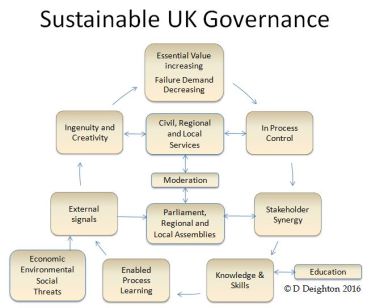
The Process improvement and control diagram above explicitly emphasises the importance of Ingenuity and Creativity in continuous learning for sustainable governance.
It is clear that in a resource constrained environment, where, as identified below, Ingenuity and Creativity are also constrained, all efforts to their creation and application must be to the sole aim of sustainable governance in a democracy. To
“identify, maximise and defend the Essential Value available to society created and retained over time and to distribute it equitably at continually reducing Resource Intensity and Failure demand”
It is the fact that in any organisation or society, Ingenuity and Creativity are limited. This was identified by Thomas Homer in his book ‘The Ingenuity Gap‘ and it was also identified as a problem in the UK in an Ofsted Report as a missing element in education.

Sugata Mitra’s experiments in self-teaching detailed here in the TED Talk he gave in 2010, have virtually proved that learning is an emergent property when small groups of students have access to information they can share. He provides at the end of the Talk a definition.
“Education is a Self Organising System where Learning is an Emergent Phenomenon”
We are failing our learners if we do not lever the potential of social media and the internet to liberate the creativity all children possess and largely lose as they grow up with the educational model we have used since the beginning of the Industrial Revolution . Ken Robinson makes this point in probably one of the most watched TED Talks, Do Schools Kill Creativity.
The problem, of course, is not with the children, it is with Society, Teachers and Industry; simply because they were not exposed to this concept of ‘emergent learning’ and the unlimited expectations of their mentors as they grew up.
In reality out traditional educational model never served, but in this time of exponential change,where more children will be passing through education in the next fifty years than have ever done, we cannot create inspirational teachers fast enough to liberate the necessary creativity that will enable us to solve the problems presented in the One Planet World we now inhabit.
The other key issue of course is the necessity we have to reduce the resource and carbon intensity of SystemUK by considerable amounts.
We must liberate the creativity to do this by design, or resource availability, at a price we can afford to pay as a society, or the Earth will do it for us.
In all this a key point is being missed and this is the need to maintain and generate the ‘tacit’ skills our society requires.